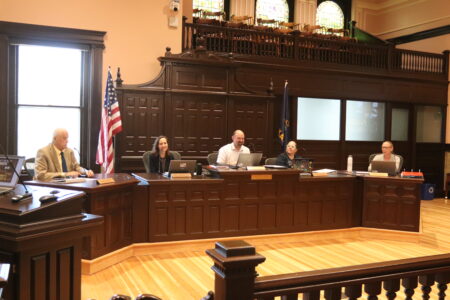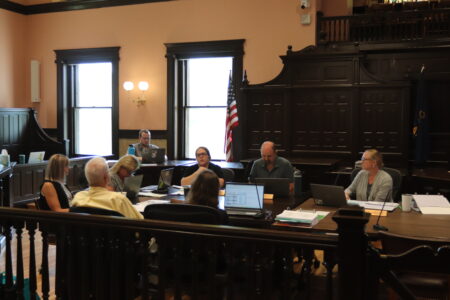‘This American Life’ host Ira Glass talks storytelling, emotional moments and magic tricks ahead of his Lawrence visit

photo by: Contributed Photo/Sandrasonik.com
"This American Life" host Ira Glass will give a talk at the Lied Center this month.
What makes a story worth telling? To illustrate, Ira Glass does a magic trick. After a couple of attempts with an unwieldy object he grabbed because he did not have a coin, there is the sleight of hand, and the object seems to vanish and then reappear.
“If you do it right, the trick works on you too,” Glass said.
What he means is that there needs to be a wow moment — a surprise, a moment of humor or emotion — that you feel as well before you can expect to create a story that entertains anybody else. And in that way there is really nothing magic about it. It starts with the journalist having an interest in the person, the person’s story and what the events made the person think or feel. When the moment appears, that’s it — that’s the trick.
Ahead of his upcoming talk at the Lied Center, Glass, creator and host of public radio’s “This American Life,” spoke with the Journal-World via Zoom about the storytelling process, what drove him to create a new style and what situations still make him nervous after more than 28 years on the air. The show, which has more than 5 million weekly listeners, has won seven Peabody Awards and the first Pulitzer Prize ever awarded for audio journalism.
Journal-World: People often credit you with creating a new style in public radio; this conversational, intimate style that contrasted with the authoritative or detached style that people were more used to. Were you trying to create a new style or what led you there?
Ira Glass: I was absolutely trying to create a new style. I had worked at NPR since I was 19 — and I love NPR, have no bad feelings about NPR, and still for news coverage, they’re just great. But I felt like if you’re not doing the news, you have the luxury of doing things differently. Our show is very much designed as like counter-programming to that. From noticing what got through to me when I listened to the radio, it seemed really clear that things just get to you more on the radio if the aesthetics are different, if the person is talking like a normal person and not like a news presenter. And so from the beginning, our show was really designed with that in mind. And before I put “This American Life” on the air, I actually worked on a local show in Chicago with a couple of friends that was on kind of late Friday nights, where I would experiment with different ways to train myself out of talking like an NPR reporter and train myself into talking like myself. But (also) working from a script, and going to cuts of tape, and playing music underneath, trying to just design a style for a thing that felt more alive.
JW: I’ve heard you describe “This American Life” as “little movies for radio.” Is there something in particular for you that makes a story worth telling? Is there a big thing?
IG: It doesn’t have to be a big thing, it just has to be a surprising thing. It just has to be a story where there’s a moment in it that you would feel excited to present to another person. It’s funny because sometimes we’ll be putting together stories for the show, and we’ll go out and do the interviews and assemble it, and it kind of mechanically works, like it’s a story with a beginning and a middle and an end and the person has some thought about what happened. But you just go through it, and you just think, like, “Yeah, OK, whatever.” You need there to be a part of it that you’re looking forward to as you’re listening, even if you’re making it, you know what I mean? It has to be a magic trick that works on yourself. When I was a little kid, I learned magic tricks from books and when you’re practicing sleight of hand, if you’re making a coin disappear or something, if you do it right, the trick works on you too … And radio stories should be like that too. Basically it needs a little X factor. It needs you to be like, “Oh, that’s really interesting.” Or, “Oh, that’s kind of funny.” It needs to be designed around those moments that just feel like, “Oh, wow.”
JW: One of the characteristics of the show is the narrative storytelling format — something with a plot and a beginning, middle and an end. You set it up, and if you do it right, there’s narrative tension, right? And people listen all the way through to the end. I feel like the real clincher for me, though, is when you get those emotional moments, because after that narrative tension falls away, that’s what you’re left with. How do you find the emotional center of a scene and what’s your gauge for whether you’ve succeeded?
IG: That’s a really interesting question. I feel like my answer is going to be kind of crude. How you find it is, you really just have to talk to the person about what happened to them and just be interested. … There was this episode a couple of weeks ago that Chana Joffe-Walt, one of our producers, did where she was just looking for stories about how people were holding up in Gaza.
[In the episode, “Yousef’s Week,” Joffe-Walt had a series of conversations with Gazan Yousef Hammash. Because shellings and bombings were increasing in Khan Younis, the area where his extended family resided, he was building tents in an area farther south, with plans to move them. At a certain point, Joffe-Walt asked whether anybody in the family was hesitant to move, and Hammash said a sister who was seven months pregnant wanted to stay, in part because the tents lacked a private bathroom.]
From that point, you have a story where there are characters who are in conflict. Are they going to go? Is he going to be able to talk them into it? Is it dangerous there [in Khan Younis]? And it does get super dangerous there. The Israelis start bombing there in a pretty serious way. He doesn’t know if they’re going to get out. From that point, you have narrative suspense, and you have plot, and you’re asking, where does the emotion go? Really, she just has to walk him through what happened. She has no idea where the story’s going, and she calls him back over the course of the week. Then when stuff works out, doesn’t work out, she just basically gets him to talk about, like, “OK, so what are you thinking?” Half the time when we do this, the story doesn’t unfold in an interesting way that you could put on the radio, or the people aren’t so reflective about it and don’t have anything to say about it. So, so much stuff that we try just dies before we even get very far — half or two-thirds of the stuff we make. Then to answer your question, of how do you get the feeling? You get the feeling by just being sensitive to what the person is going through and being curious, so they want to tell you. I mean this sounds so, like, “follow the force,” Yoda kind of talk, but really that’s all you can do. You have to just see what happened and what seems interesting, and that will take you to the feelings and everything else.
JW: Are there certain types of interviews or situations you come across in your work for “This American Life” that still make you nervous or uncomfortable?
IG: Yes. There are two categories. One is with interviewees and the other is with my own staff. The interviewees one is that there are some people who you just feel worried about whether or not you’re going to get the story out of them, you know? … We did this episode in the fall of ’22 about politics in the state of Ohio.
[The episode, “Mapmaker, Mapmaker, Make Me a Map,” centers on a recent constitutional amendment Republicans passed to end gerrymandering in the state. The same Ohio Republicans subsequently drew electoral maps that violated their own constitutional amendment, and the episode tries to understand how that happened.]
The guy who basically changed their constitution was this one state legislator who was the president of the state senate. And basically the whole episode I have all these other politicians talking about him. The Republicans saw him as kind of a political mastermind, which he is, actually, and Democrats thought he was just pure evil. And at some point, I had to talk to this man and get his side of it. I really wasn’t sure what he was going to say — he hadn’t done interviews about it. And really I thought for a long time he might not even talk to us. But I guess we seemed like legit news and we reach a lot of people and so he did, which I was grateful for. Going into that interview, I was really nervous because I felt like I really needed him to respond to some pretty messed up stuff that people accused him of. And you want to be polite to a person but you also want to be firm and Anderson Cooper-like, you know? I feel like that’s the kind of interview where you want to be like (news anchors) Jake Tapper, Anderson Cooper and very calmly state: Here’s what people say about you and it seems to be true, so what do you say? And I am not an expert at that kind of interview at all. I feel like I can do it, but it’s not something I have a lot of practice at.
… Then the other times I get nervous are when we have a story, and I don’t know how to make it work, and I think maybe it should die. We just had a story like that recently on the show, where somebody had worked really hard on the story and I really had high hopes for the story — we all did — and she’s like a wonderful person, a super hard worker, great journalist, but this particular one, just the facts weren’t laying out and the interview didn’t happen in exactly the right way. So we kept trying to remake it and remake it and remake it. We had done a lot of the fact checking, which was the most labor-intensive part, but we still couldn’t make it come to something interesting at the end in the right way.
JW: The talk coming up, “Seven Things I’ve Learned,” is from your perspective. How does telling your own stories or your own anecdotes compare to telling the stories of others? Which is more difficult for you?
IG: Neither is more difficult. It’s the same for me. Even if it’s super personal. In fact, it’s easier if it’s super personal. There’s been some stuff that I’ve talked about on the radio in the last year or two that’s so personal. And I feel like actually that’s easier. At that point, it’s just a story and I don’t feel a sense of privacy. I feel like it’s my job to find things to say on the radio that other people haven’t said and tell stories. I just feel like, “OK, like it’s a good story,” and so it’s not any different to me.
JW: What would you highlight about the show?
IG: It really is just a bunch of stories that I think would be fun to tell in front of an audience. Some of them are funny, some of them are just amazing, great stories. I pick and choose some of the best stuff we’ve put on the air and also things that have taught me something. It’s designed to be entertainment with some feeling. That’s all. The name of the show is just an excuse to tell seven stories.
“Seven Things I’ve Learned: An Evening with Ira Glass,” will take place at 7:30 p.m. on Jan. 27 at the Lied Center, 1600 Stewart Drive.







